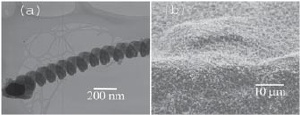Mar 29 2009
GoNano Technologies, Inc., a Moscow, Idaho based nanotechnology company specializing in the development of high surface area Nanospring technology, recently received a Phase I SBIR grant in the amount of $97,761 from the National Science Foundation to develop novel electrodes for next generation ultracapacitors.

"This Phase I SBIR award will generate valuable information on the integration of nanomaterials into energy storage devices with broader technological implications for battery and fuel cell electrodes," said Dr. David McIlroy, Vice President-Research at GoNano Technologies. "Additionally, new knowledge will be developed about how to best functionalize one-dimensional nanostructures and how processes can be appropriately scaled."
The key to ultracapacitor design is a high surface area electrode material because this material determines energy capacity. GoNano Technologies, Inc will use their patent-pending Nanospring mats as a low cost, high surface area scaffolding for constructing ultracapacitor electrodes. Optimizing the properties of ultracapacitors through the integration of nanostructured materials with high surface area and controlled surface chemistry will allow more widespread implementation of this technology.
"With higher energy density and a lower cost than conventional electrodes, GoNano's Nanospring technology overcomes two long-standing market barriers", said Tim Kinkeade, CEO of GoNano Technologies. "This scalable, efficient, and industry compatible system is of significant interest to ultracapacitor manufacturers everywhere."